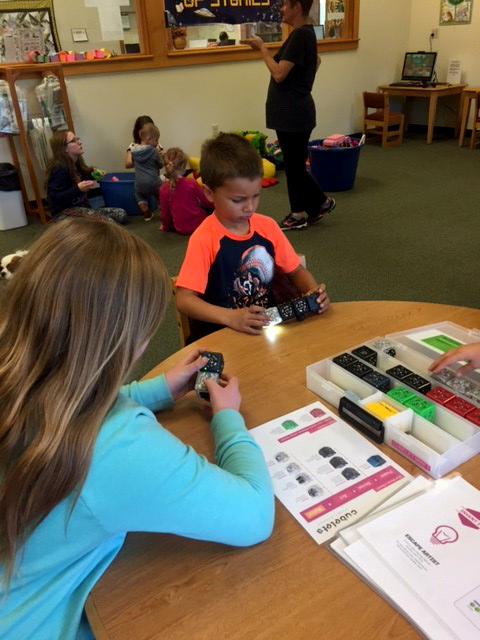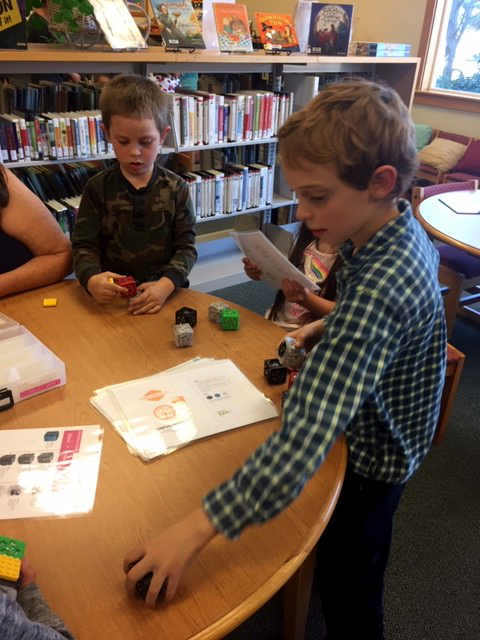‘Check out’ STEAM learning
Libraries join efforts to encourage STEAM thinking
Youth were recently invited to “light up a turkey’s eyes” using copper tape, LED lights and batteries at the Riddle City Library. In Sutherlin, at the C. Giles Hunt Memorial Public Library, robot building blocks have appeared among the shelves of books. And at the Roseburg Public Library, “Girls Who Code” events have invited third- through fifth-graders to explore the world of computer coding.
Libraries around Douglas County have been diving into the world of STEAM education, offering activities and programs that focus on science, technology, engineering, artful innovation and mathematics. These community gathering places have become key partners in promoting STEAM thinking, which helps children acquire the 21st-century skills that are in high demand in the workforce.
“One of the goals is to keep the children engaged in not only reading and enjoying good books, but participating and learning some fun and educational skills using activities on their learning level,” said Rita Radford, director of Library Services at Riddle City Library. “STEAM events have been useful for working toward this goal.”
A recent event for sixth-grade and middle school students focused on copper circuitry connecting LEDs with a button battery to make the eyes light up on Thanksgiving turkey cards. Other events have focused on balance, and children have also made Bristle Bots using toothbrush heads with tiny vibrating motors attached.

Over at the Sutherlin library, funds from the Douglas County Library Foundation have gone toward Legos, foam blocks, electric circuits, a sewing machine and a button maker, as well as arts and craft supplies, according to Nancy Anderson, who’s been in charge of children’s programs since 2017. Anderson also checks out items from the Umpqua Valley STEAM Hub Resource Lending Library, which offers a wide range of activities, technology and other tools for educators to borrow and use in their classrooms or other teaching spaces.
“Our program has been greatly enhanced with the material available through the STEAM hub,” said Anderson, who has attended trainings on early childhood learning, STEAM education and other programs to help her dial in the library’s programming. “We have used the Cubelets and the Osbots and plan to use Makey Makey, the Marble Runs and the electric circuits in the near future.”

Children work with Cubelet robot building blocks at the C. Giles Hunt Memorial Library. Photo courtesy of the library.
Last month, Roseburg Public Library announced it was creating a new Maker Space where anyone can come and experiment with technology and other tools that emphasize learning and collaboration. Three items the space will include at all times include an LX3817 Brother sewing machine, a 1-inch button maker and a LulzBot Taz 3D printer. The library expects to supplement the space, which will open to the public in December, with items from the STEAM Hub lending library.
The Maker Space is being led by the library’s Resource Assistance for Rural Environments AmeriCorps participant and is also supported by the Oregon Technology Access Program, a program of the Douglas Education Service District.
Roseburg Library Director Kris Wiley said libraries are great community spaces in which to offer STEAM activities because they can provide free and low-cost access to tools in an informal learning setting.
Wiley and Katie Fischer, the AmeriCorps participant, agree that libraries play a vital role in encouraging lifelong learning.
“STEAM-related experiences are so vital because they encourage kids to problem-solve in a creative way, and it teaches kids to value curiosity in science and technology,” Fischer said. “The library, in particular, is a great setting for these experiences because we want to help people become more familiar and comfortable with STEAM activities in an encouraging and judgment-free manner.”
Leave a Reply
You must be logged in to post a comment.